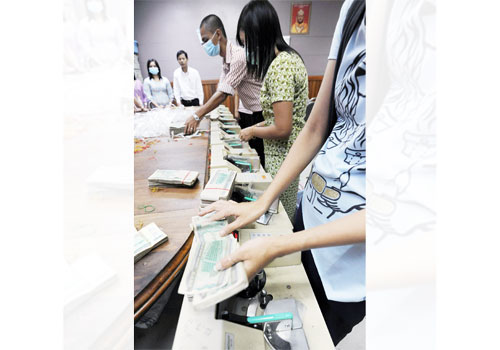Foreign banks call for market access in Myanmar
29 Jul 2015
Greater competition from international banks would encourage local lenders to move away from a small pool of high-net-worth clients to start offering products and services to those who need it most, said panellists at the Myanmar Banking and Finance Conference in Yangon yesterday.
“If more foreign banks come into the market it will increase competition and force local banks to serve more people,” said SimSeng Lim, group executive of DBS Bank.
Nine foreign banks won provisional licences in October last year – the first time Myanmar allowed onshore banking by foreign institutions since 1963. However, their operations are limited to running a single bank branch to finance international corporate clients and local banks.
Since then, some banks that lost out on the tender have been lobbying for the government to open the market further. “It might seem daunting, but you have to bite the bullet,” said Mr Lim at the event held by Sphere Conferences. “If you wait to be ready, it will take 20 or 30 years, but if foreign banks come in, they will hire and teach local people and bring up the standard.”
Greater competition would force local banks to become stronger, said Chang-Ken Lee, president of Cathay Financial Holdings and Cathay United Bank. “You can offer much better services to the customers as a result,” he said.
As international competition increases, local banks will have to reconsider their strategies and become more inclusive, said Hal Bosher, special adviser to the CEO and chair of Yoma Bank, adding that the introduction of nine foreign banks has already been felt by local banks. “At the top end of the market, local and foreign banks are fighting over a few thousand clients. Tactically, if you continue with that strategy as a local bank you will be challenged,” he said.
“The competencies of the foreign banks are much higher, the technology is better, the balance sheet is bigger. Local banks will need to adapt and go down-market, to the SMEs [small and medium-sized enterprises] where it is almost impossible for the foreign banks to follow,” added MrBosher.
Financial penetration in Myanmar is very low – less than 5 percent of the population is banked, he said. “It’s up to the local banks to raise that number. We need to be more consumer-oriented, offering products and services that make the public want to bank.”
A compromise, to speed up the development of human capital and still give local banks a chance, would be to allow joint ventures (JVs) between foreign and local banks, said Mr Lee.
“We feel that government policy [in Myanmar] could be more open-minded, and we could figure out a strategy to help local banks move more quickly, as we have done in Vietnam,” he said. Cathay United Bank has a 50-50 joint venture with Vietnam Joint Stock Commercial Bank for Industry and Trade (Vietinbank) called Indovina Bank.
However, Mr Lim of DBS Bank was less keen. “If foreign banks take an interest in a local bank and there is a scandal, it will taint the reputation of the entire group. But we can form other types of partnership, to bring in new technology and ideas, which can only be better for the market,” he said.
MrBosher warned against this. “You want your cake and you want to eat it too – you don’t want to take the risk of a JV but you want the upside. From a public policy standpoint you need to be a bit careful about that,” he said.
U SeinMaung, chair of First Private Bank and vice chair of the Myanmar Banking Association, said the market will not be ready to open further until foreign banks come up with a practical way to transfer skills to local banks.
“Without a strategy, it’s just lip service,” he said. “Technology and software we can buy, but when it comes to improving skills and knowledge, we have to rely on the foreign banks. I expect a lot from them, as without their cooperation we can’t learn much.”
The Myanmar Banking Association has invited foreign banks and international financial institutions to come up with a strategy for imparting skills, but so far only Bangkok Bank has been forthcoming, he said.
“The big global foreign banks, what is their business model? Their main objective is to make money – they don’t necessarily want to transfer knowledge and skills. I have talked about JVs to a few foreign banks, and some say, ‘I want 80pc.’ We have to find partners with the will to help develop the local banking sector,” he said.
“In theory, more competition is OK. But my feeling is that we’re not quite ready to compete.”
Source: http://www.mmtimes.com/index.php/business/15702-foreign-banks-call-for-market-access.html










